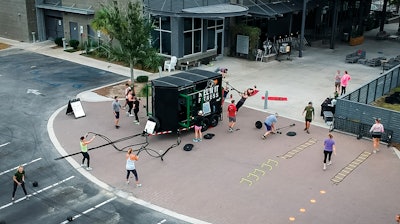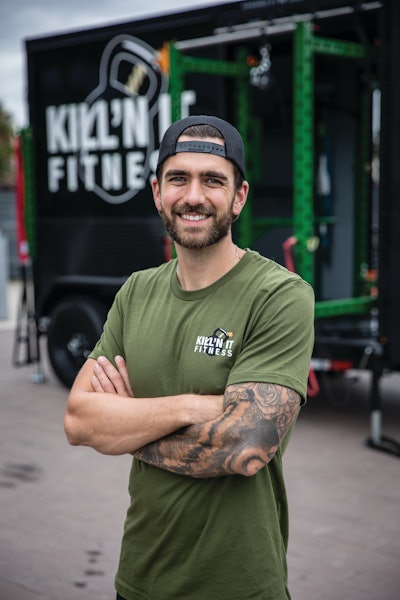

He felt his post-military calling was in fitness, so he kept pursuing the idea until a solution emerged – as well as a financial backer. He worked briefly during the pandemic in outdoor fitness, but when the distancing demand dwindled, he found a way to skip anchoring his fitness business to an address, and the overhead he couldn’t afford. Instead, Kill started to carve out a niche providing fitness options, with a specially outfitted trailer, anywhere they would have him.
The trailer is loaded with equipment such as conditioning ropes, a suspension training system, medicine balls, and much more, and the trailer itself is optimized to deploy some of the equipment. For example, the loading end of the trailer is able to accommodate the suspension training ropes, and a unique strength rack and bars fold out on the sides. “Getting the trailer set up was really the hardest part, and figuring out how to make everything work,” Kill says. “(And) figuring out where to store the trailer.”
The most frequent spot where the Kill’n It Fitness trailer can be found is a parking lot where he got permission to host events. “I have a location that I bring the trailer to where I host bootcamp classes, small-group and one-on-one training out of it,” Kill said. “It’s in a parking lot of a tech company. A lot of the people work remotely now, so they just said I can use an entire section of the parking lot for my training.”
Kill leads boot camps Monday, Wednesday and Friday, and then offers small-group or semiprivate sessions five days a week, as well as one-on-one training whenever it fits.
Expanding reach (and revenue)
Kill’n It Fitness rolled out its trailer in September, and Kill says phase two of his plan is exploring corporate partnerships in Charleston, were he’s already attended multiple human resources-related events in the interest of business expansion. “Going to companies to do team-building workouts, weekly workouts or lunch-and-learns, talking about either fitness, nutrition, team building, lifestyle, things like that,” Kill says. “That was really the big focus when I did get a trailer because, yes, I can use it for my group stuff. But because I’m mobile, I can use this for way more than just bringing it to a parking lot. Now I can make more money on this.”
Navigating mobile business challenges
Embarking on a new niche of fitness facility enterprise creates surprises, and Kill has had to navigate some challenges. “Because I live in an apartment complex, I keep my trailer at a storage facility at U-Haul,” Kill explains. “A couple of weeks ago, someone parked a U-Haul truck in front of the gate, so I couldn’t go grab the trailer. That was a little hiccup, and I had to pivot.” He said the problem didn’t squash business that day — it just inspired an equipment-free special session that clients enjoyed. “It turned into a very good bodyweight workout,” Kill says. “Everyone was accepting of it. Like, ‘Well, he’s still giving us a workout.’ ”
Kill says that he’s found success and nouveau excitement for his concept, but it took some time and endurance for the excitement to arrive. First, he had to be rejected — many times. But he says anyone who believes in their fitness venture should keep their passion in mind and persevere. “I got told no about 10 times on helping me start this from banks, brokers, loan officers, private investors,” Kill says. “You’re going to be told no, but there’s someone who’s going to believe in you, believe in your concept, who’s going to tell you yes. A no doesn’t physically hurt you. It might mentally hurt you, but that doesn’t mean that the next person is not going to say yes.
“It’s kind of like having a zero-option mentality. This is where I want to go. How do I make it?”





































